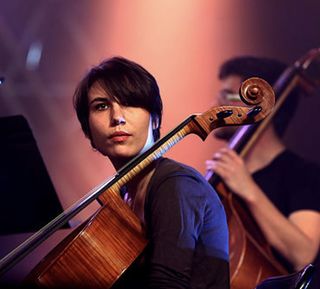Anxiety
Flip the Script on Performance Anxiety
A radical change in perspective may stop stage fright before it starts.
Posted May 23, 2019 Reviewed by Davia Sills
Many musicians fancy themselves to be artistic problem-solvers. Whether it’s learning a new piece from the classical repertoire or overcoming writer’s block as a songwriter, responding to difficulties and setbacks seems to be part of the musical life.
In music—and perhaps in life—we can address each problem we face in an overly dichotomous way. We think we must either accept the problem and learn to function with it, or take it on and battle against it until it’s been overcome. Some problems, however, are best solved through a big-picture approach, whereby the problem is eliminated altogether. As the saying goes, we “flip the script.”

Flipping the script means turning the tables in a situation or doing the unexpected, such that the situation is turned on its head. Based on a couple of new research articles in the latest issue of the journal Psychology of Music, the problem of performance anxiety may be most effectively handled when musicians use radically realistic thinking to flip the script on it.
In one study with university music students, researchers Osborne and McPherson (2019) worked with young performers over the course of a semester, culminating in an end-of-term recital examination. From the start of their study, some of their participants viewed the upcoming performance as a threat (i.e., an event they could do poorly at, compared to others), and other participants saw it as a challenge (i.e., an opportunity to gain or accomplish something). Those who viewed the performance as a challenge experienced a greater increase in self-efficacy (belief in their performance ability) across the semester, had less pre-recital worry, and received better performance exam scores (as judged by music performance specialist examiners).
Another research article in the same issue of the journal considered the relationship between music performance anxiety and flow experience. Flow (Csikszentmihalyi, 1990) is often described as an immersive state of optimal engagement and enjoyment. Perhaps not surprisingly, the research study of Cohen and Bodner (2019) found that flow is antithetical to performance anxiety.
One of the most defining characteristics of flow is a balance between the challenge of a task and the skill level of the person doing it. In their study of professional orchestral musicians in Israel, Cohen and Bodner found that performance yields flow experiences regularly for these classical musicians. The skills-challenge balance was found to be one of the top contributors to the musicians’ experiences of flow. Further, it appears that more advanced musicians have learned to better balance the skills vs. challenge equation for themselves, thus allowing them to experience flow in performance more often than younger performers and music students do.
The results of these recent research studies lead me to conclude that musicians can flip the script on performance anxiety by practicing “radical realism.” One way to look realistically at stage fright is to consider it from a simple physiological perspective. The adrenaline-fueled, “fight-or-flight” physiological defense mechanism is activated when people perceive a threat. Musicians afflicted with performance anxiety can gain much by realistically examining why they feel threatened by performing music.
That stage fright is a threat response points to the irrationality of it all. In reality, music performance, most simply understood, is the artistic sharing of human expression with other people who are mostly predisposed to enjoy it. How does this act of creative human interaction become an experience to be battled through and survived (fight) or feared and avoided (flight)? Of course, it is also realistic to acknowledge that many public performances can have very serious consequences for musicians themselves.
Even so, it is much more beneficial to view a consequential performance as a challenge, rather than an anxiety-inducing threat. As Osborne and McPherson's research suggests, this is not merely a matter of semantics. Considering an important performance as a challenge puts a musician in the mindset of accomplishment rather than (as with a threat) one of struggling to survive.
Musicians who do experience their performances as anxiety-inducing threats may need to work on striking a better balance between their skills and the performance tasks they take on. Perhaps they are attempting to learn pieces of music that are just too difficult for them at their current stage of musical development. Or maybe they are taking on performance projects that will require practice and preparation that they realistically cannot make time for. Either way, their skill level is being exceeded by the challenge of the performance task, and as such, they should realistically expect to experience anxiety.
Also, I would suggest that it is, in fact, quite rare for a performing musician to take the stage in any real danger of “totally bombing” or being laughed at or booed off the stage. To help ensure that this type of disastrous outcome does not become a real possibility, performers should aim to do more than just “get through” a performance. They should even aspire for more than giving a good performance, as defined by a lack of mistakes and convincing expressivity. Performing musicians should make as their goal having the intrinsically rewarding flow experience each time they take the stage. This way, performance will not only be emotionally fulfilling to their audiences, but also to the musicians themselves.
Speaking of reality, it’s probably safe to assert that very few people in any audience are actually hoping for a bad performance that they can criticize; on the contrary, the vast majority of people in any audience are predisposed to think the performance is good! So in almost all performance circumstances, a big, potent dose of realistic thinking—if it can truly take effect inside the mind of a performer—may be able to stop stage fright before it starts.
Although many conceive of performance anxiety as a struggle between positive and negative thoughts, it is better understood as a choice between rational and irrational thinking. Put another way, musicians don’t solve the problem of stage fright by replacing pessimistic self-criticism with sunshiny self-praise and optimism; rather, they should seek to fend off irrational thought patterns by entrenching themselves in the reality of their musicianship and the reality of what music-making is as a basic human experience.
Copyright 2019 Robert H. Woody
References
Csikszentmihalyi, M. (1990). Flow: The psychology of optimal experience. New York, NY: Harper and Row.
Cohen, S., & Bodner, E. (2019). The relationship between flow and music performance anxiety amongst professional classical orchestral musicians. Psychology of Music, 47(3), 420-435.
Osborne, M. S., & McPherson, G. E. (2019). Precompetitive appraisal, performance anxiety and confidence in conservatorium musicians: A case for coping. Psychology of Music, 47(3), 451-462.




